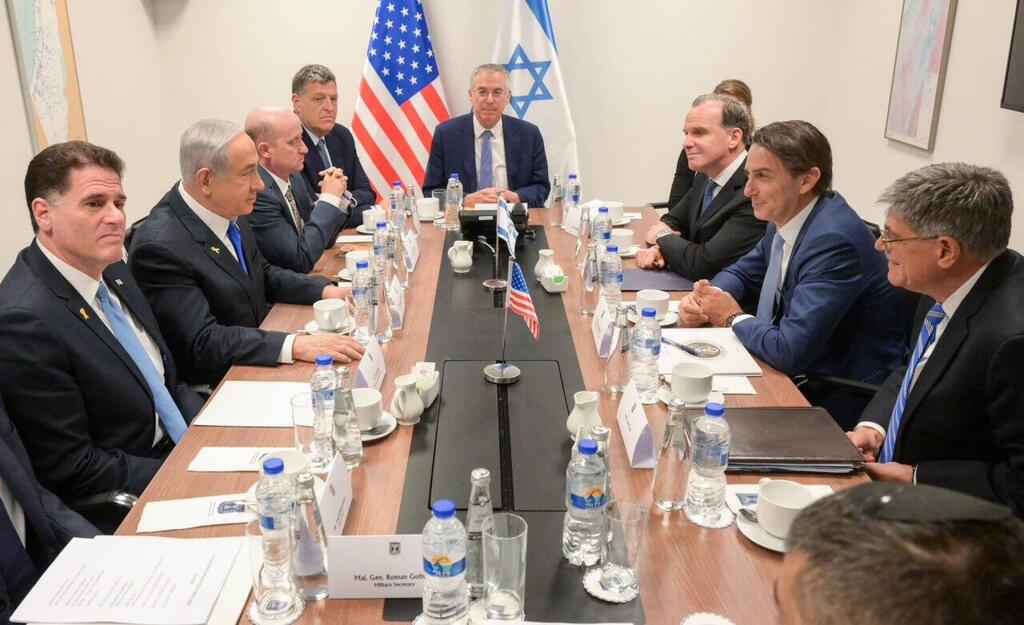American efforts to halt fighting between Israel and Hezbollah have failed after the U.S. drafted an "unrealistic" cease-fire proposal and Israel's insistence on being able to enforce a truce directly, people briefed on the diplomacy told Reuters.
Meanwhile, Lebanese Parliament Speaker Nabih Berri claimed on Friday that Prime Minister Benjamin Netanyahu rejected a U.S.-backed proposal for a cease-fire with Hezbollah.
3 View gallery


Prime Minister Benjamin Netanyahu, President Joe Biden and Hezbollah chief Naim Qassem
(Photo: AP Photo/Hassan Ammar, REUTERS/Evelyn Hockstein, REUTERS/Mohamed Azakir)
“The Israeli prime minister rejected Lebanon’s proposed roadmap, which was agreed upon with U.S. envoy Amos Hochstein,” he said in an interview with the Arabic-language London-based newspaper Asharq Al-Awsat.
The newspaper further reported that “political efforts to resolve the crisis have been postponed until after the U.S. elections.”
Al Jazeera quoted a source close to Berri as saying, "An agreement with Hochstein was reached in Beirut on provisions to be implemented within 60 days. These provisions include a complete cease-fire between Lebanon and Israel, the deployment of the Lebanese Army to the southern border and the withdrawal of all unofficial military presence to north of the Litani River."
Lebanon’s Al Jadeed channel added that "only after this will negotiations to resolve the issue begin."
With no workable proposal on the table ahead of Tuesday's U.S. presidential election, the conflict could drag on for months, according to a Lebanese political source close to Hezbollah, two diplomats and a person briefed on the talks. They all spoke on condition of anonymity.
The office of Prime Minister Benjamin Netanyahu did not respond to questions from Reuters.
Political sources in Lebanon told Saudi-owned Al Arabiya television they anticipate a likely escalation in the coming days as talks stall, though U.S. officials have described the discussions as "substantive and constructive." The U.S. also emphasized that “public negotiations” are not part of Washington’s approach to these discussions.
According to a draft of the proposal reported by The Wall Street Journal, Israel would retain the right to conduct defensive strikes in Lebanon for 60 days to address “imminent threats.” During this period, Israel would also oversee the implementation of the cease-fire and UN Security Council Resolution 1701, which ended the 2006 Lebanon War. The proposal calls for the withdrawal of Israeli forces from Lebanon within a week, after which the Lebanese Army would be deployed to dismantle Hezbollah’s military infrastructure in southern Lebanon.
3 View gallery


US envoy Amos Hochstein and Lebanese Prime Minister Najib Mikati meeting in Beirut
(Photo: Anwar AMRO / AFP)
Hezbollah and the Lebanese government, however, reportedly rejected the proposal, claiming it grants Israel excessive latitude for cross-border operations. Lebanese officials noted they preferred to avoid publicly dismissing the proposal, as it leaves room for further negotiations that could eventually lead to an end to hostilities.
In Israel, U.S. envoys Hochstein and Brett McGurk met with Israeli leaders, returning to the U.S. without a stop in Lebanon. Israeli officials dismissed claims that the lack of a Lebanon visit indicates stalled progress, saying, "We never expected this to resolve in just a few days."
U.S. Secretary of State Antony Blinken remarked, "We’ve made strides towards implementing Resolution 1701 as a foundation for a political agreement between Israel and Hezbollah.” When questioned on the matter by Reuters, State Department officials referred to Blinken’s comments.
IDF strikes in Tyre, southern Lebanon
After the U.S. team’s visit, Israeli sources familiar with the negotiations described an understanding between Israel and the U.S., with Hochstein and McGurk set to brief President Joe Biden and National Security Advisor Jake Sullivan upon their return to Washington before possibly heading to Lebanon to finalize the deal.
"The U.S. side document is crucial; it provides Israel the backing it needs to act if necessary," an Israeli official said, adding that action is expected given likely violations until the Lebanese Army takes control.
Meanwhile, Israel expressed pessimism over separate talks with Hamas for a hostage deal. According to sources, Hamas has demanded a complete end to the war, rejecting smaller-scale arrangements.
"This isn’t looking promising," an Israeli official said, noting that mediators have not returned with an official response to avoid a total breakdown in talks. "After the U.S. elections, we might see a creative approach. A victory by Harris could keep momentum going for a larger deal that ends the war."
Get the Ynetnews app on your smartphone:





